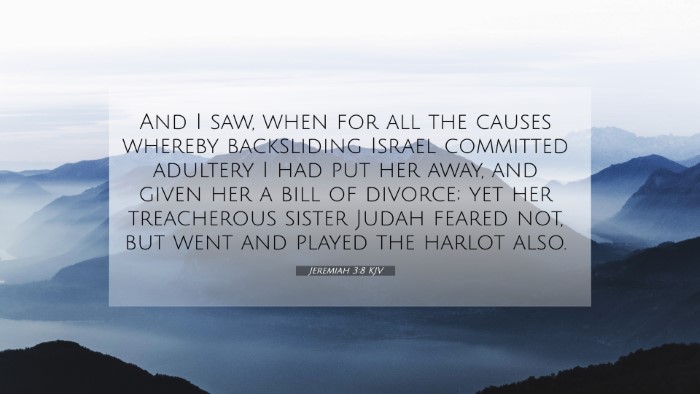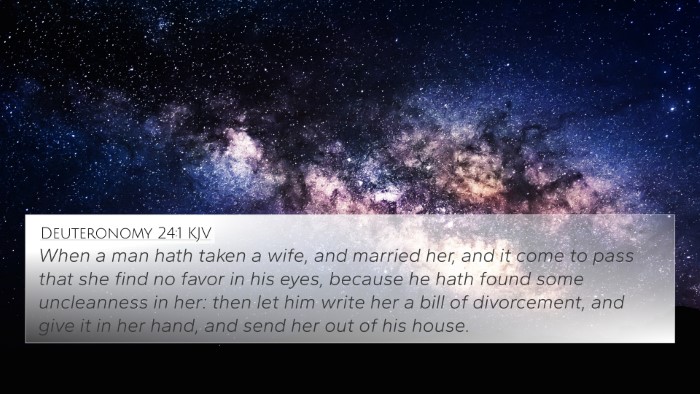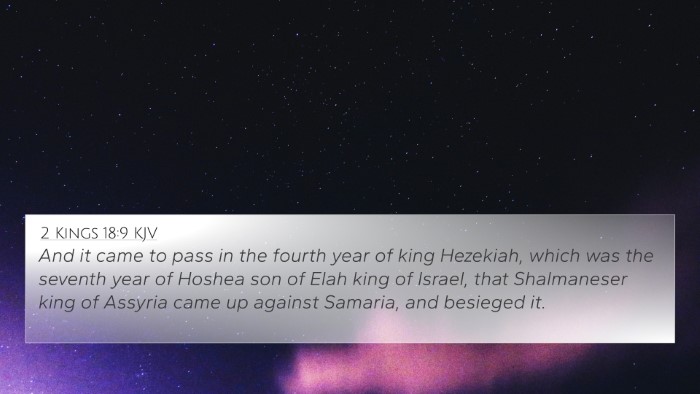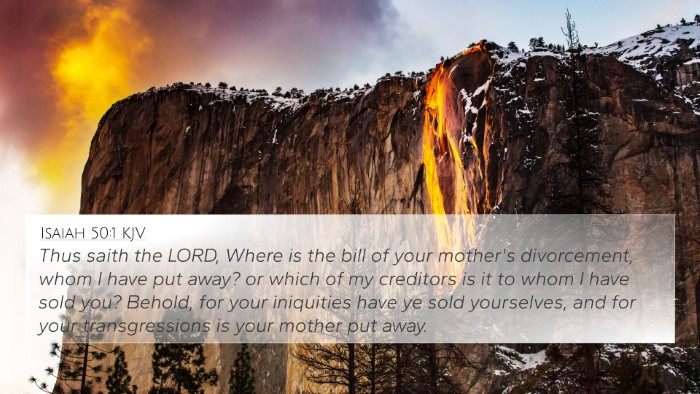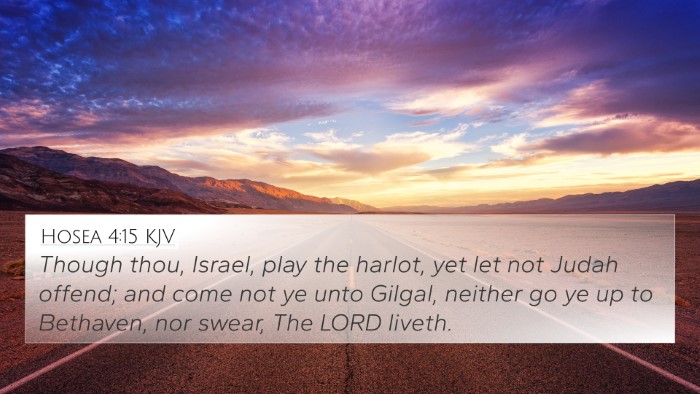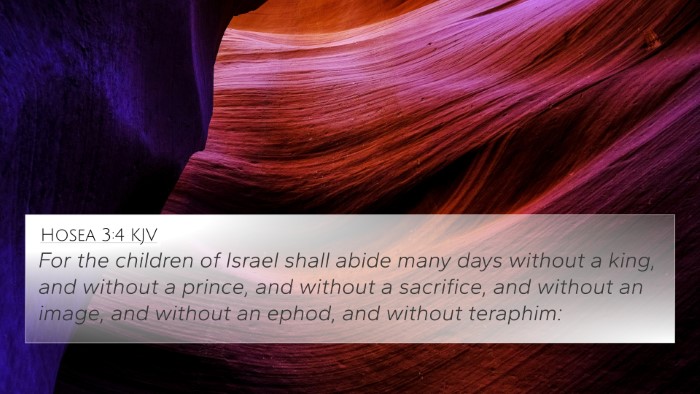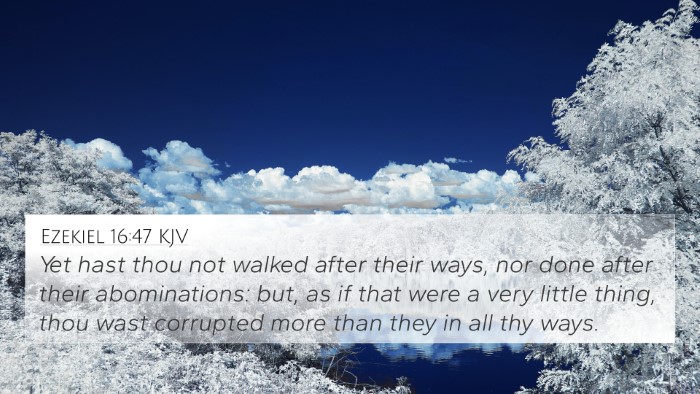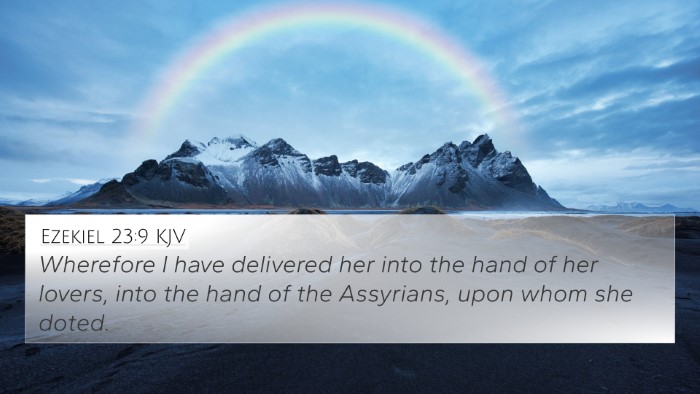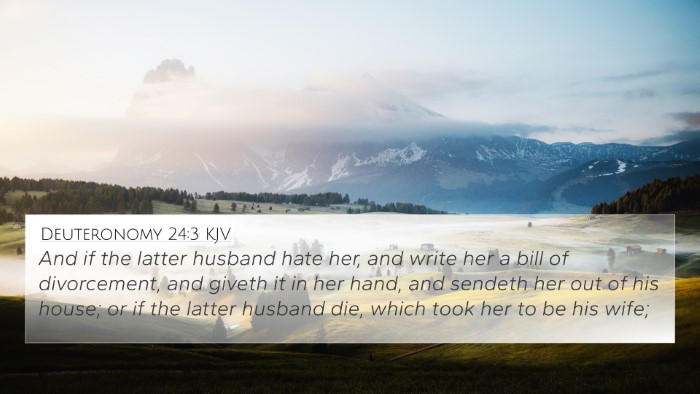Understanding Jeremiah 3:8
Jeremiah 3:8 states, "And I saw, when for all the causes whereby backsliding Israel committed adultery I had put her away, and given her a bill of divorce; yet her treacherous sister Judah feared not, but went and played the harlot also." This verse depicts God's judgment against Israel for their unfaithfulness and serves as a warning to Judah, showing the serious consequences of apostasy.
Context and Significance
In this verse, the Lord uses the metaphor of marital infidelity to address Israel's unfaithfulness to Him. Matthew Henry emphasizes God's sorrow over Israel’s betrayal, signifying the covenant relationship between God and His people, which is often likened to a marriage. Israel's idolatry is portrayed as adultery, showing the gravity of turning away from God. Adam Clarke notes that this bill of divorce symbolizes a definitive separation due to persistent infidelity.
Thematic Connections
This verse aligns with several biblical themes, particularly the concept of covenant fidelity. It can be connected to various scriptures that elaborate on the relationship between God and His people. Below are some key themes and verses that interlink with Jeremiah 3:8:
- Idolatry as Spiritual Adultery: Hosea 1:2 – “The beginning of the word of the Lord by Hosea. And the Lord said to Hosea, Go, take unto thee a wife of whoredoms and children of whoredoms: for the land hath committed great whoredom, departing from the Lord.”
- God's Reluctance to Divorce: Malachi 2:16 – “For the Lord, the God of Israel, saith that he hateth putting away: for one covereth violence with his garment, saith the Lord of hosts: therefore take heed to your spirit, that ye deal not treacherously.”
- The Call to Repentance: Isaiah 55:6-7 – “Seek ye the Lord while he may be found, call ye upon him while he is near: Let the wicked forsake his way, and the unrighteous man his thoughts.”
- Judah's Warning: Lamentations 3:40 – “Let us search and try our ways, and turn again to the Lord.”
- Faithfulness Amid Apostasy: Revelation 2:4-5 – “Nevertheless I have somewhat against thee, because thou hast left thy first love. Remember therefore from whence thou art fallen, and repent.”
- Salvation for a Remnant: Romans 11:5 – “Even so then at this present time also there is a remnant according to the election of grace.”
- God's Compassion Despite Sin: Ezekiel 18:31 – “Cast away from you all your transgressions, whereby ye have transgressed; and make you a new heart and a new spirit: for why will ye die, O house of Israel?”
- Promise of Restoration: Jeremiah 30:17 – “For I will restore health unto thee, and I will heal thee of thy wounds, saith the Lord.”
- The Nature of Divine Judgment: Galatians 6:7 – “Be not deceived; God is not mocked: for whatsoever a man soweth, that shall he also reap.”
- Covenantal Faithfulness: 2 Timothy 2:13 – “If we believe not, yet he abideth faithful: he cannot deny himself.”
Analytical Insights
The comparative bible verse analysis can help us understand the themes of judgment, mercy, and repentance present in the Bible. Through cross-referencing biblical texts, we can see how the call for faithfulness reverberates throughout both the Old and New Testaments. Albert Barnes remarks on the significance of this verse as it highlights the idea that one nation’s sin can influence another's behavior, exemplifying a pattern of collective moral failure.
Practical Applications
For believers today, this verse serves as a profound reminder of the importance of remaining faithful to God. The challenges of spiritual fidelity are echoed in modern times, where individuals are often tempted to stray from their commitments. Tools for Bible cross-referencing can aid in studying these themes in greater depth, allowing for a richer understanding of one’s faith and the interconnectedness of scripture.
Conclusion
Jeremiah 3:8 captures the heartache of God towards a wayward Israel, juxtaposing His justice with His desire for reconciliation. By examining the inter-Biblical dialogue and the connections between Bible verses, we may better appreciate God’s unwavering commitment to His covenant people and His call for repentance. The overarching theme of fidelity in relationship to God remains both a warning and a source of hope.


